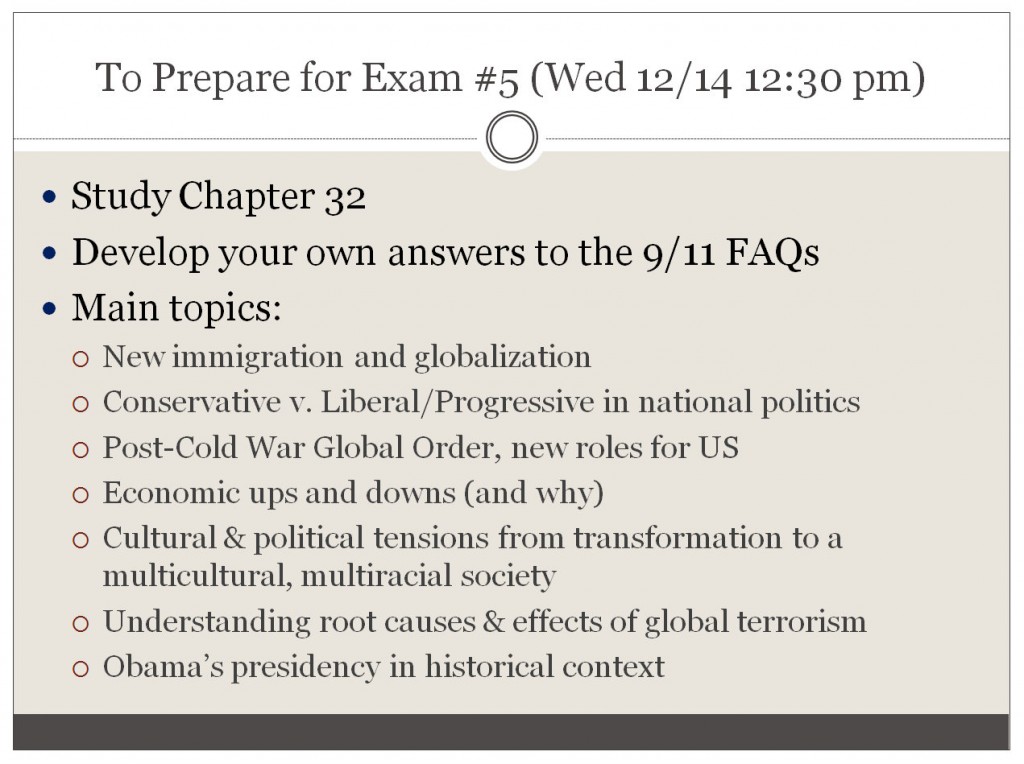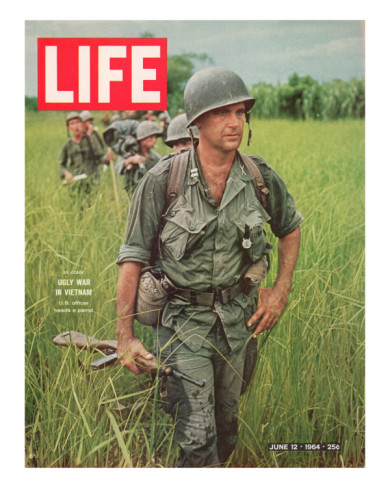Unit 5 Exam on 12/14
by Dr. H - December 9th, 2011
Our final exam will be on Wednesday, December 14th 12:30 – 3:30 pm in the LRC-327 classroom.
How to prepare:
What to bring:
You may bring ONE sheet of 8.5×11 paper with notes (or anything) on it. You can use the front and back; put as much or as little on it as you like.
Thanks for a great semester! — Prof H.
History Now, Today and Tomorrow: Course Wrap-up
by Dr. H - December 8th, 2011
Fri 12/9: History Today and Tomorrow.
Your “History Now†project is due in or before class. No electronic submissions, it must be turned in as a paper packet.
Reading for Friday’s class is EH 32:923-929 and Barack Obama’s speech given on December 6, 2011 in Osawatomie, Kansas. Why did he give it there? What parts of US history was he deliberately invoking, and why? How would you set this speech into historical context, given what you now know about US History since 1877 and what you now know how about how historians approach historical texts?
You can either read the speech, or watch it (it takes about an hour to watch).
Your 9/11 Questions
by Dr. H - December 3rd, 2011
These will be the basis of our class discussion next Wednesday. You’ll be working on answering them to your satisfaction and so will I, and let’s bring our thoughts together next Wednesday to build a collective framework for understanding this complex event and its many repercussions in our nation and world today.
Questions Re: 9/11/2001
Why did the hijackers choose the specific date of 9/11/2001?
Why were the World Trade Center towers the target? What was their importance or significance?
What were the motives of this attack? Why did they attack us?
What did the hijackers think was going to happen?
Where was Flight 93 headed, what was its intended destination?
What kind of security breaches occurred at the related airports that allowed the hijackers and their weapons on board the aircraft?
Why did groups that we supported in the 1980s and 1990s later turn into terrorist groups so hostile and determined to hurt our country?
Why did the US give Arabs weapons in the 1990s?
Were there any signs this was going to happen?
If the government knew what the terrorists were planning, was there really a conspiracy or did the attackers just get lucky?
Choose a Reading for Wed 12/7
by Dr. H - December 2nd, 2011
Links for in-class viewing on Fri 12/2
9/11 Ten Years Later (History Channel)
George W. Bush Address to the Nation, 9/11/2001
Wednesday’s class on 12/7 will be focused on addressing your questions, curiosity and knowledge gaps about 9/11/2001. Remember to keep our Unit 5 model in mind. Start with the event itself: what happened, and what did it mean? Then work either forwards (legacy, consequences, short and long-term effects) or backwards (what do you need to know in order for this event to make sense to you?).
Choose your own reading from the list below; these include resources, articles, videos, curriculum lesson plans, and other material from 9/11/2001 and the 10-year commemoration earlier this fall. Take a close look through at least one of these links, and read more if you feel you need more.
Time Magazine special issue 9/2011 – “Beyond 9/11: Portraits of Resilience”
New York Times, “9/11: The Reckoning”
Wall Street Journal 9/12/201,1 “America Grieves, Reflects”
History.com resources on 9/11: Ten Years Later
Resources on 9/11 Commemoration from the National Council for Social Studies
“Understanding 9/11” Resource Guide for Educators from the Foreign Policy Research Institute
“9/11 as History” – lesson plans and programs for kids K-12
9/11 Commission Report (2004) http://www.9-11commission.gov/
Unit 5: America Today
by Dr. H - November 26th, 2011
In the last unit of the course, we will jump to the post-Cold War era (approx since 1989). There will be an online quiz opening on Tuesday, November 29th until Sunday, December 4th (on Chapter 30 and 31). Our in-class work will deal mainly with material in Chapter 32.
Mon 11/28: After the Cold War – read EH 32: 887-899. Handout: Foreign Policy, 1980s-1990s (a companion chart for your reading of Chapters 31 and 32). In-class viewing: ABC News, November 10, 1989
Wed 11/30: Globalization and the United States – read EH 32:900-917
Fri 12/2: All about 9/11/2001 – read EH 32:917-923. Skill Builder #6, the last one, is due in class
Mon 12/5: A workshop day, focusing on the “History Now” project. No assigned reading. If you revised your Primary Source paper, the revision is due in class (no electronic submissions).
Wed 12/7: Your FAQs Answered. Reading: 9/11 materials of your choice, see the list in the entry for Friday 12/2
Fri 12/9: History Today and Tomorrow. Reading: EH 32:923-929 and one additional short reading, TBA. Your “History Now” project is due in or before class. No electronic submissions, it must be turned in as a paper packet.
Last Exam: The 5th exam will be Wednesday 12/14 at 12:30 pm in our classroom. It is the regular exam for Unit 5, not a comprehensive final.
Exam 4 on Monday
by Dr. H - November 19th, 2011
Our Unit 4 exam will be on Monday, Nov 21. I am out of town presenting at a conference (the AAR in San Francisco) but Dr. Lisa Boehm from Urban Studies will be there in my place to give out and collect the exam. I hope everyone has a wonderful Thanksgiving break and I’ll see you on the other side of the turkey and pie.
On Friday in class, I wrote a list on the board of 11 reasons former Secretary of Defense Robert McNamara (whose resignation is covered in your book) thought — in retrospect — that the United States had blundered in Vietnam. Here is the list, and for you snorkelers/divers, you can read excerpts on Google Books from the original if you like. Think about whether you agree with this list and what evidence you can think of to support or refute McNamara’s statements.
- We misjudged North Vietnamese and Viet Cong’s geopolitical intentions and exaggerated their dangers
- We viewed South Vietnam in terms of our own experience instead of theirs
- We underestimated the power of Vietnamese nationalism
- We didn’t have enough trained advisors for Asia in positions of responsibility in the military and the State Department, and had too few well-informed senior diplomats
- It was high-tech warfare v. low-tech people and failed to win their hearts and minds
- Didn’t involve Congress and public debate enough
- Didn’t retain popular support at home, were too secretive
- We have no “God-given right to shape every nation in our image”
- It was a unilateral action and all unilateral actions are doomed
- Although the US is powerful and rich, it can’t solve every problem in every nation
- It proved too hard to sustain a long-term effort and momentum over many different presidential administrations at the top levels of the military
My recommendations for studying: review Chapter 30 closely. Be able to identify, list or discuss events that happened during the Vietnam Era both in the US and in the region of Vietnam. Have a working understanding of how the conflict began, how it progressed, and how it ended. Be able to distinguish among anti-war organizations and talk about the rise & fall of a protest movement and some of its main events. Consider your notes from the M*A*S*H episode and what cultural productions like that program add to our historical understanding of the era. Re-read Theriault’s article and be prepared to discuss the contradictions and complexities of the Vietnam Memorial, and of the wall’s role in American public memory about the war.
Road to Quagmire, Wed 11/9
by Dr. H - November 9th, 2011
Here are the slides from today’s lecture/discussion. Much of this same information is covered in greater depth in the reading assignment: EH Ch 28:794-804 and Ch 30:842-848, 865. Also, don’t forget to notice Veteran’s Day articles, events or commemorations that refer back to the Vietnam War – try to bring in something to share on Monday. Have a great holiday weekend!
Unit 4: The 1960s
by Dr. H - November 6th, 2011
Our unit on the 1960s will focus on the Vietnam War and the conflict that resulted–both in Southeast Asia and on the American homefront.
The unit’s online quiz will open Monday, Nov 7 at 9:00 am and close on Monday, Nov 14 at midnight. The online quiz concerns the movement for civil rights in the 1950s and 1960s (Chapter 29 of your textbook).
In class, we will be dealing primarily with Chapter 30 in this unit.
Mon, Nov 7: An in-class workshop, working with sources for your first research-based paper (see “Projects” tab above for more info and guidelines for the paper), which is due on Monday, Nov 14th.
Wed, Nov 9: The Road to Quagmire. Before class, read EH, Ch 28:794-804 and Ch 30:842-848 and 865
Fri, Nov 11: No class, Veteran’s Day. How appropriate! Look for news coverage or local events that connect to the Vietnam conflict, and try to bring something to share in class on Monday.
Mon, Nov 14: Vietnam in Pop Culture. No reading; Primary Source Project paper is due.
Wed, Nov 16: Protest and Conflict at Home. Before class, read EH Ch 30:826-832 AND online, the testimony of William Crandell, giving his opening statement before the “Winter Soldier Investigation” Congressional Panel, January 31-Feb 2, 1971.
Fri, Nov 18: Remembering Vietnam. Reading: EH Ch 30: 868-871, and an article by Kim Servant Theriault, “Re-Membering Vietnam: War, Trauma, and ‘Scarring Over’ After ‘The Wall’” (PDF)
Mon, Nov 21: Unit 4 exam in class
Reminder: No class on Wed, Nov 23 – enjoy your Thanksgiving holiday
Photo credit: Allposters.com
Americans and the Bomb, Wed 11/2
by Dr. H - November 2nd, 2011
Reading for class: Terry Tempest Williams, “The Clan of One-Breasted Women” (PDF)
Slides from Wed’s lecture/discussion:
Links for America’s love-hate relationship with atomic power:
Nuclear toys and Atomic Brand Names (Retronaut)
For more on the “radium girls,” see here.
“Atomic Energy as a Force for Good” (1955) Part I (13:09)
See also “Plowshare” (1961) Part I, a futuristic (fantasy) peaceful uses of atomic power 15:30
Nuclear Detonation Timeline, 1945-1998 (10:00)
Radiation Monsters of the Silver Screen
“Them” 1954 film trailer (3:00)
“Attack of the Crab Monsters” 1957 trailer (2:00)


